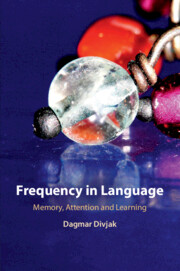5 - Entrenching Linguistic Structures
from Part II
Published online by Cambridge University Press: 26 September 2019
Summary
Usage-based linguistics is predicated on the assumption that language knowledge emerges from exposure to language use. It seems generally accepted that, through repeated exposure, units of varying size are identified and gradually become encoded and differentially entrenched in memory. Key to this is the assumption that frequency-sensitive learning results in mental representations, if not optimized then at least suited for a particular environment. It may seem odd to equate these mental representations, i.e., mental traces of linguistic forms with something as prosaic as memories, but they must be memories: memories capture information that has been encoded and can influence future processing. There is no requirement for memories to be conscious or to be recallable, and they are not restricted to any one dimension of our experience, nor do they exclude any dimensions.
- Type
- Chapter
- Information
- Frequency in LanguageMemory, Attention and Learning, pp. 131 - 158Publisher: Cambridge University PressPrint publication year: 2019

